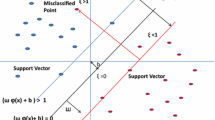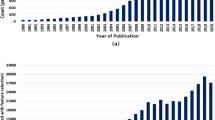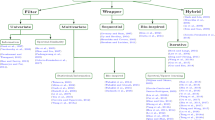Abstract
In this paper we describe a method for denoising data using kernel principal component analysis (KPCA) that is able to recover preimages of the intrinsic variables in the feature space using a single line search along the gradient descent direction of its squared projection error. This method combines a projection-free preimage estimation algorithm with an \(\ell ^1\)-norm KPCA. These two stages provide distinct advantages over other KPCA preimage methods in the sense that they are insensitive to outliers and computationally efficient. The method can improve the results of a range of unsupervised learning tasks, such as denoising, and clustering. Numerical experiments in the Amsterdam Library of Object Images demonstrate that the proposed method performs better in terms of mean squared error than the \(\ell ^2\)-norm analogue, as well as in synthetic data. The proposed method is applied to different datasets and the results are reported.







Similar content being viewed by others
Data availability
The image datasets generated during and/or analysed during the current study are available in the Amsterdam Library of Object Images repository at https://aloi.science.uva.nl.
References
Brooks, J.P., Dulá, J.H., Boone, E.L.: A pure \(L_1\)-norm principal component analysis. Comput. Stat. Data Anal. 61, 83–98 (2013)
Markopoulos, P.P., Dhanaraj, M., Savakis, A.: Adaptive l1-norm principal-component analysis with online outlier rejection. IEEE J. Sel. Top. Sign. Process. 12(6), 1131–1143 (2018)
Candès, E., Li, X., Ma, Y., Wright, J.: Robust principal component analysis? J. ACM 58(3), 1–37 (2011)
Chierichetti, F., Kumar, R., Raghavan, P., Sarlos, T.: Are web users really markovian? In: Proceedings of the 21st International Conference on World Wide Web, pp. 609–618 (2012)
Kwak, N.: Principal component analysis based on l1-norm maximization. IEEE Trans. Patt. Anal. Mach. Intell. 30(9), 1672–1680 (2008)
Paluš, M., Dvořák, I.: Singular-value decomposition in attractor reconstruction: pitfalls and precautions. Phys. D: Nonlinear Phenom. 55(1–2), 221–234 (1992)
Xu, L., Oja, E., Suen, C.Y.: Modified Hebbian learning for curve and surface fitting. Neural Netw. 5(3), 441–457 (1992)
Bui, A.T., Im, J.-K., Apley, D.W., Runger, G.C.: Projection-free kernel principal component analysis for denoising. Neurocomputing 357, 163–176 (2019)
Schölkopf, B., Mika, S., Burges, C.J., Knirsch, P., Muller, K.-R., Ratsch, G., Smola, A.J.: Input space versus feature space in kernel-based methods. IEEE Trans. Neural Netw. 10(5), 1000–1017 (1999)
Im, J.-K., Apley, D.W., Runger, G.C.: Tangent hyperplane kernel principal component analysis for denoising. IEEE Trans. Neural Netw. Learn. Syst. 23(4), 644–656 (2012)
Nguyen, M., Torre, F.: Robust kernel principal component analysis. Adv. Neural Inf. Process. Syst. 21, 2 (2008)
Kim, C., Klabjan, D.: A simple and fast algorithm for \(\ell _1\)-norm kernel PCA. IEEE Trans. Patt. Anal. Mach. Intell. 42(8), 1842–1855 (2019)
Boser, B., Guyon, I., Vapnik, V.: A training algorithm for optimal margin classifiers, pp. 144–152 (1992)
Vapnik, V.: The nature of statistical learning theory (1999)
Schölkopf, B., Smola, A., Müller, K.-R.: Kernel principal component analysis. In: International Conference on Artificial Neural Networks, pp. 583–588, Springer (1997)
Schölkopf, B., Mika, S., Smola, A., Rätsch, G., Müller, K.-R.: Kernel PCA pattern reconstruction via approximate pre-images. In: International Conference on Artificial Neural Networks, pp. 147–152, Springer (1998)
Kwak, N.: Nonlinear projection trick in kernel methods: an alternative to the kernel trick. IEEE Trans. Neural Netw. Learn. Syst. 24(12), 2113–2119 (2013)
Geusebroek, J.-M., Burghouts, G.J., Smeulders, A.W.: The Amsterdam library of object images. Int. J. Comput. Vis. 61(1), 103–112 (2005)
Acknowledgements
The authors would like to express their sincere gratitude to anonymous reviewers for their valuable insights. Algorithm 1 is implemented in C using key functionality in the Intel oneAPI Math Kernel Library to achieve performance on Intel CPU architectures. The code is openly accessible and can be forked from the repository at https://github.com/lingxpca/kl1pca.git.
Author information
Authors and Affiliations
Corresponding author
Additional information
Publisher's Note
Springer Nature remains neutral with regard to jurisdictional claims in published maps and institutional affiliations.
Rights and permissions
Springer Nature or its licensor (e.g. a society or other partner) holds exclusive rights to this article under a publishing agreement with the author(s) or other rightsholder(s); author self-archiving of the accepted manuscript version of this article is solely governed by the terms of such publishing agreement and applicable law.
About this article
Cite this article
Ling, X., Bui, A. & Brooks, P. Kernel \(\ell ^1\)-norm principal component analysis for denoising. Optim Lett (2023). https://doi.org/10.1007/s11590-023-02051-3
Received:
Accepted:
Published:
DOI: https://doi.org/10.1007/s11590-023-02051-3




